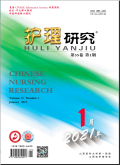护理研究2024,Vol.38Issue(14):2476-2483,8.DOI:10.12102/j.issn.1009-6493.2024.14.005
基于自我决定理论的婴儿母乳回应性喂养干预方案的构建及应用
Construction and application of breastfeeding responsive feeding intervention program for infants based on self-determination theory
摘要
Abstract
Objective:To construct an breastfeeding responsive feeding intervention program for infants based on self-determination theory and preliminarily to explore its application effects.Methods:50 parturients who gave birth in a tertiary hospital were selected as subjects by convenient sampling methods from February 1,2023 to May 31.The parturients were divided into intervention group and control group,with 25 cases in each group.Based on self-determination theory,a breastfeeding responsive feeding intervention program for infants was constructed through literature review,group discussion,and Delphi expert inquiry.The control group received routine nursing measures implemented by the hospital's obstetrics department,while the intervention group implemented breastfeeding responsive feeding intervention program for infants on the basis of the control group.The parturients knowledge level of responsive feeding,breastfeeding self-efficacy,breastfeeding motivation,pure breastfeeding rate,weight and length of infant were compared between the two groups.Results:During the construction process of breastfeeding responsive feeding intervention program for infants,the response rates of the 2 rounds of expert inquiry questionnaires were both 100%,the authority coefficients were 0.92 and 0.94,the coefficient of variation ranged from 0.00 to 0.29 and ranged from 0.05 to 0.20,the Kendall coefficient of concordance were 0.214 and 0.165(both P<0.001).After intervention,the score of parturients knowledge level of responsive feeding in intervention group was(16.80±0.50)points,the score of breastfeeding self-efficacy was(58.16±9.33)points,the score of self-motivation was(61.00±5.79)points,the score of controlled motivation was(29.08±3.27)points,all of which were higher than the control group,the score of parturients knowledge level of responsive feeding in control group was(13.56±2.35)points,the score of breastfeeding self-efficacy was(44.84±8.60)points,the score of self-motivation was(51.04±8.36)points,the score of controlled motivation was(24.00±3.81)points.The pure breastfeeding rate of intervention group were higher than those of the control group on the day of discharge,one week after discharge,and 42 days postpartum.Conclusions:The breastfeeding responsive feeding intervention program for infants constructed in this study is scientific and reliable,which is conducive to improving parturients knowledge level of responsive feeding,breastfeeding self-efficacy,it can also help parturients to establish breastfeeding motivation and improve pure breastfeeding rate.关键词
自我决定理论/母乳喂养/回应性喂养/德尔菲法/护理Key words
self-determination theory/breastfeeding/responsive feeding/Delphi method/nursing引用本文复制引用
赵淑良,邵清春,祖新霞,苗逸群,刘文文,姜汇敏,李亚男,王爱华,张媛媛..基于自我决定理论的婴儿母乳回应性喂养干预方案的构建及应用[J].护理研究,2024,38(14):2476-2483,8.基金项目
教育部产学合作协同育人项目,编号:201902104007 ()

